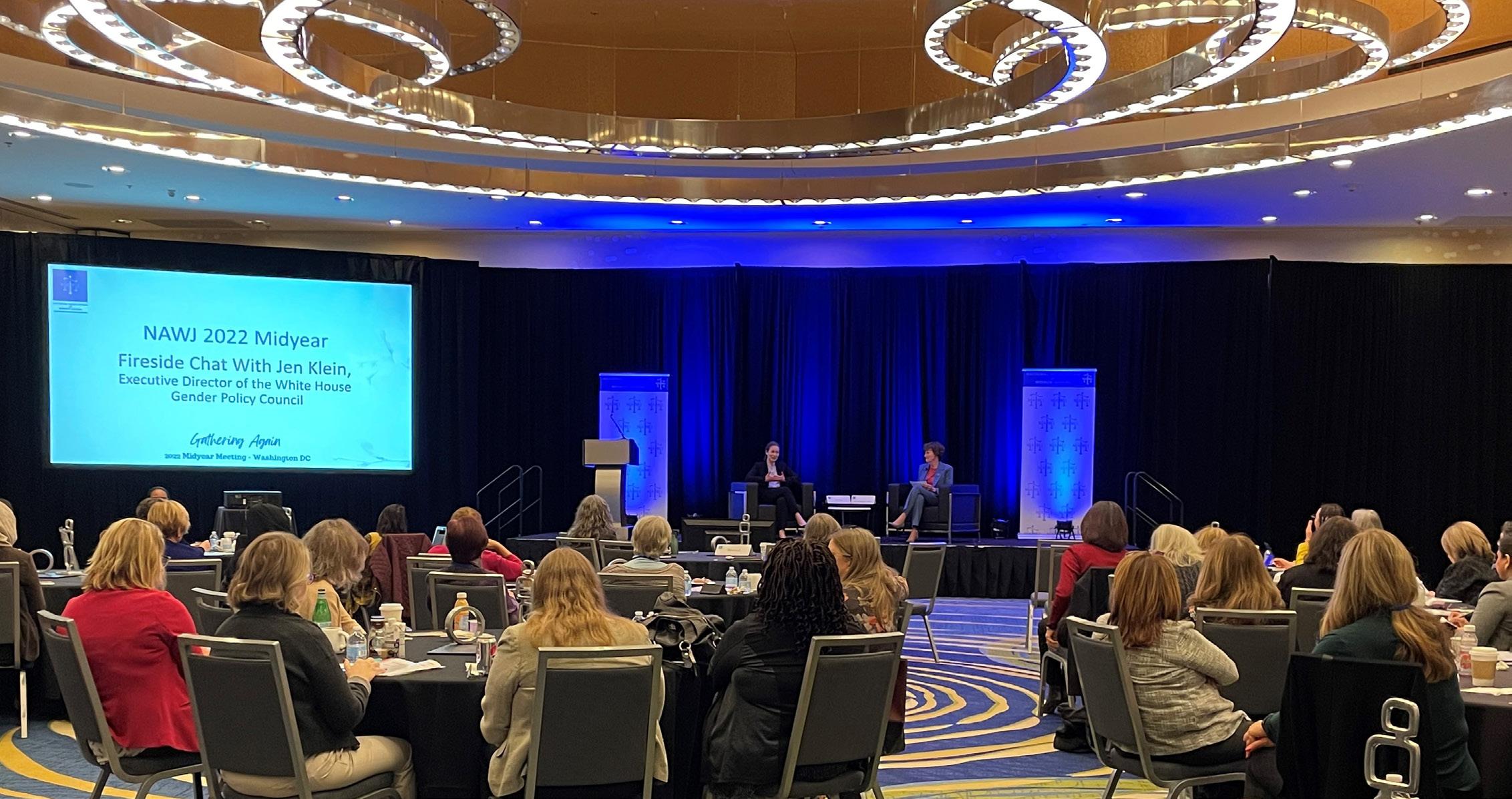
5 minute read
Understanding Implicit Bias is a Matter for Mandatory CLE
from Counterbalance - Summer 2022
by NAWJ
I recently co-chaired the National Association of Women Judges’ committee on Racial Disparities in the Courts and had a chance to interview the Honorable Judge Bernice Donald on the 6th Circuit United States Court of Appeals who was invited to speak. I met Judge Donald over 12 years ago when she was presenting a breakout session on implicit bias at a joint Alaska Bar / Judicial Conference at the Dena’ina Center. Hundreds of lawyers and judges attended the conference but less than a dozen people attended Judge Donald’s breakout session on this important and emerging topic. I thought then as I do now, “how do you get lawyers and judges to realize the impact of implicit bias in the legal profession?”
By Hon. Pamela Scott Washington
Anchorage District Court Judge Vice President of Districts, NAWJ
am an advocate for implicit bias education and a proponent of mandatory continuing legal education on implicit bias. In my 25plus years as a member of Alaska’s legal community, I have personally experienced how implicit biases can narrow a person’s vision and influence their behaviors. I also became keenly aware of my own biases and remain vigilant and intentional to eliminate them from my judicial discretion and decisions. As co-chair of the Alaska Supreme Court’s Fairness, Diversity, and Equality Commission and member of the Cultural Competency subcommittee, I am involved with a team of judicial officers working to ensure ongoing implicit bias education and training is provided to all Alaska judges. It is not just the judiciary, but the integrity of every part of our system of justice is under scrutiny. As members of the legal profession, this should concern us.
I believe there are two main barriers to making mandatory CLE credits for cultural competency, diversity, inclusion, and implicit bias education. One barrier is “race.” The other barrier is “mandatory.”
The issue of race has always been difficult to talk about, especially for those who are members of the predominant group. The predominant group that makes up 93.4% of the Alaska Bar membership may be adversely triggered by words like race, critical race theory, white privilege, and racial injustice, and may think of implicit bias in the same way. Implicit bias is not an accusation of racism. In fact, implicit bias is not about racism, or sexism, or ageism, or any other “isms.” It is about your subconscious brain and mental associations. Judge Donald explained that implicit bias is the process by which the brain uses well established mental associations to operate without our awareness, without intention, or control. “It is that human computer program that is working in the background that is influencing our actions and our thoughts even when we are not aware of it and it is contrary to our announced and deeply held values.” These associations are a product of our backgrounds, lived experiences, our in groups, and our out groups. As members of the Bar, even when we believe we are fundamentally fair at our core, we cannot disregard the fact that bias is baked in. Unbeknownst to us, our brains are sorting information and making conclusions that compromise the good judgment of fundamentally fair, well intentioned people. Consider that an adverse reaction to training on implicit bias may well be an indication of implicit bias at work in us.
In the introductory statement of the Alaska Rules of Professional conduct, we are reminded that lawyers should seek improvement of the law, access to the legal system, the administration of justice, and the quality of service rendered by the legal profession. If we know the influence of implicit bias creates deficiencies in the administration of justice, then we should act to minimize these deficiencies in the interests of living up to the ideals of equal justice for all. We are all vulnerable and when we know we have a blind spot that can be obstructing our view, we must be intentional about removing the obstruction so we can see clearly.
The other barrier to overcome in support of imposing a mandatory CLE on implicit bias is “mandatory.” Members of the Bar would probably not oppose voluntary CLEs addressing such topics, but prefer to retain the right to choose. However, this is more than a matter of personal choice. It is a matter of professional competency.
Mandatory requirements reflect what we value as members of the legal community. We value education and professional competency. It is the reason why it is mandatory that lawyers graduate from an accredited law school, pass a Bar Exam, and engage in mandatory continuing legal education. Rule 1.1 of the Alaska Rules of Professional Conduct articulates this value—a lawyer shall provide competent representation to a client. Competent representation requires effective communication with a very diverse population. Effective communication requires a level of cultural competency and a sensitivity to that human computer program working in the background unconsciously influencing our actions and thoughts.
We already recognize the importance of removing bias from the law. When a judge knows they have a personal bias or prejudice concerning a party or a party’s lawyer, Cannon 3E(1)(a) of the Code of Judicial Conduct, states the judge shall disqualify himself or herself when a judge’s impartiality might be reasonably questioned. Unconscious biases are more important because they may have an impact on impartiality yet never be recognized in lawyering or judicial decision-making. We value professional competency and we make what we value “mandatory.” Unconscious bias is an ethical issue and should be a mandatory part of continuing legal education.
Other professions are recognizing the need for mandatory implicit bias and cultural competency education and training. Professional organizations such as Joint Commission and Liaison Committee on Medical Education require training in implicit bias for accreditation. Implicit bias training is mandatory for all nurses in California and Michigan. Mental and behavior health clinicians are required to complete mandatory education and training hours on cultural competency for licensure. As of November 15, 2019, Missouri requires attorneys to complete three (3) Ethics credits every year, one (1) of which must cover topics addressing Cultural Competency, Diversity, Inclusion,








